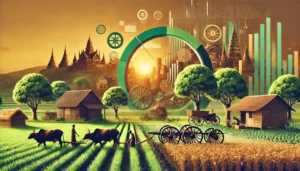
How buying land can help you grow money
The Importance of Land & Agriculture in Financial Stability – Investing in Land Like Our Ancestors Did
Since ancient times, land has been the foundation of wealth and security. Our ancestors, whether kings, warriors, or farmers, understood the significance of land as a source of sustenance, power, and economic stability. While modern financial systems focus on digital assets, stocks, and volatile investments, the importance of land has never diminished. It remains one of the safest and most rewarding long-term assets.
As we navigate an unpredictable economic landscape, it is worth revisiting the traditional wisdom of investing in land and agriculture. Doing so not only ensures financial stability but also strengthens food security and promotes sustainable wealth creation.
The Historical Significance of Land Ownership
Throughout history, civilizations have risen and flourished based on their relationship with land. The Indus Valley Civilization, Mesopotamia, and ancient Egypt thrived due to fertile land and well-managed agricultural systems. In India, the concept of zamindari (landlordism) emphasized land as a primary source of wealth, while in Europe, feudal lords amassed power through vast agricultural estates.
Even in the modern world, developed nations owe much of their progress to well-planned agricultural policies and land management. Countries like the United States, China, and Russia have used land resources to drive economic growth and maintain food security. This historical perspective highlights why land remains an essential asset in achieving long-term financial stability.
Table of Contents

How buying land can help you grow money
Why Land and Agriculture Still Matter Today
- Land Is a Limited and Appreciating Asset
Unlike other commodities, land is finite. As populations grow and urbanization expands, the demand for land continues to rise, making it a valuable long-term investment. Over time, well-located agricultural or residential land appreciates in value, providing a hedge against inflation and market fluctuations.
- Agricultural Income and Self-Sufficiency
Owning agricultural land allows individuals and families to generate income through farming. With the global demand for food increasing, agricultural landowners have the opportunity to cultivate crops, lease farmland, or even invest in agro-processing industries.
Traditional farming methods, combined with modern technology, can significantly boost productivity and profitability. Organic farming, permaculture, and sustainable agriculture are gaining popularity, offering both economic and environmental benefits.
- Protection Against Economic Uncertainty
The modern financial system is heavily dependent on market speculation, digital currencies, and rapidly changing investment trends. Stocks and cryptocurrencies can lose value overnight due to global crises, inflation, or economic downturns. Land, on the other hand, remains a stable asset that retains its intrinsic value, regardless of market fluctuations.
During economic recessions, individuals who own land can continue to generate income through farming, leasing, or real estate development, ensuring financial security even in uncertain times.
- Passive Income and Multiple Revenue Streams
Landownership provides diverse opportunities for wealth generation:
- Agriculture: Growing cash crops, organic farming, dairy farming, or poultry farming
- Leasing: Renting land to farmers, agribusinesses, or commercial developers
- Agro-tourism: Developing farm stays, resorts, or wellness retreats
- Renewable Energy Projects: Installing solar farms or wind turbines on unused land
- Timber and Forestry: Cultivating trees for timber, medicinal plants, or bamboo plantations
By diversifying land use, investors can ensure a steady flow of income while preserving the land for future generations.
- Land as a Legacy for Future Generations
Our ancestors viewed land as a family treasure passed down through generations. Unlike paper assets that can be lost or devalued, land remains a permanent inheritance. Families that own land can ensure financial stability for their descendants, creating generational wealth.
Many modern families are rediscovering this wisdom by investing in rural land, reviving traditional farming practices, and reconnecting with their agricultural roots.
How to Invest in Land Like Our Ancestors Did
While land remains a valuable asset, investing wisely is key. Here are some principles inspired by our ancestors’ approach to land ownership:
- Choose Fertile and Well-Located Land
Not all land is created equal. Before investing, consider factors like soil fertility, water availability, climate conditions, and proximity to markets. Well-located land near growing urban centers or transport hubs tends to appreciate faster.
- Prioritize Sustainable Farming Practices
Traditional agriculture relied on natural methods, organic composting, and seasonal crop rotation to maintain soil fertility. Modern investors should adopt eco-friendly practices such as permaculture, agroforestry, and regenerative farming to ensure long-term productivity.
- Think Long-Term
Unlike stocks or short-term investments, land requires patience. Instead of expecting instant profits, investors should focus on long-term gains through gradual land development, sustainable farming, and strategic leasing.
- Diversify Land Use for Maximum Profitability
Owning land provides multiple earning opportunities. Investors can engage in mixed-use farming, set up farm-to-table businesses, explore agro-tourism, or even lease sections of the land for renewable energy projects. This diversification ensures steady income while preserving the land’s value.
- Preserve and Protect the Land for Future Generations
Land is not just a financial asset—it is a legacy. Responsible landowners should prioritize conservation, avoid overexploitation, and pass down sustainable farming knowledge to future generations.

How buying land can help you grow money
The Future of Land Investment
As urban expansion and industrialization continue to consume arable land, agricultural land will become even more valuable. Governments worldwide are encouraging agricultural self-sufficiency, making rural land investment a strategic move for the future.
Additionally, the global shift towards organic food, sustainable farming, and local food production presents new opportunities for landowners. Smart investors who embrace these trends will benefit not only financially but also in contributing to a healthier, more self-reliant world.
Conclusion
In an era where digital assets dominate investment conversations, land remains a timeless and irreplaceable asset. Our ancestors built empires, sustained families, and ensured financial security through land ownership. Today, by following their wisdom, we too can achieve long-term stability and prosperity.
Investing in land and agriculture is not just about financial returns—it is about creating a sustainable future, preserving natural resources, and building generational wealth. As the old saying goes, “Buy land—they’re not making it anymore.”
(FAQs) on “Land & Agriculture: The Timeless Key to Financial Stability – Investing Like Our Ancestors”:
- Why is land considered a stable investment?
Land is a finite resource that appreciates over time. Unlike stocks or volatile assets, land retains value and often increases in price due to population growth and demand for real estate or agriculture.
- How did our ancestors view land and agriculture as wealth?
Our ancestors considered land as the ultimate form of wealth, providing food, shelter, and economic security. Owning land ensured self-sufficiency and generational wealth, making it a cornerstone of financial stability.
- Is investing in agriculture still profitable today?
Yes, agriculture remains a strong investment due to the constant demand for food and raw materials. With sustainable farming techniques, organic production, and modern technology, agricultural land can yield significant returns.
- What are the benefits of investing in farmland?
Farmland offers multiple advantages, including:
Long-term appreciation
Passive income from leasing or crop production
Hedge against inflation
Tangible asset ownership
- How does land investment compare to stock market investments?
Land investments are less volatile and provide long-term stability, whereas stocks can be unpredictable. While stocks offer liquidity, land ensures wealth preservation and potential for passive income.
- What factors should I consider before buying agricultural land?
Before investing in agricultural land, consider:
Soil fertility and water availability
Legal clearances and land ownership history
Proximity to markets and infrastructure
Government policies and subsidies
- Can urban dwellers invest in agriculture?
Yes, urban investors can buy farmland and lease it to farmers, invest in agricultural startups, or use modern techniques like hydroponics and vertical farming for urban agriculture.
- How does land investment act as a hedge against inflation?
As the cost of living rises, land values and agricultural produce prices also increase, ensuring that landowners maintain purchasing power over time.
- What are some sustainable ways to use agricultural land for profit?
Organic farming
Agroforestry and permaculture
Eco-tourism and farm stays
Leasing land to farmers or agribusinesses
- What are the risks associated with land investment?
While land investment is relatively stable, risks include:
Legal disputes over ownership
Environmental challenges like drought or floods
Market fluctuations in agricultural commodities
Summary
Land & Agriculture: The Timeless Key to Financial Stability – Investing Like Our Ancestors
Throughout history, land and agriculture have been the bedrock of wealth creation and financial stability. Our ancestors recognized that owning land was not just about possession but about securing a sustainable future for generations. Land provided food, resources, and economic opportunities, making it one of the most valuable assets in any civilization. Unlike currency, which fluctuates in value, or stock markets, which are subject to volatility, land remains a tangible and appreciating asset.
In today’s fast-paced, technology-driven world, the traditional wisdom of investing in land is often overlooked in favor of digital assets and short-term financial instruments. However, land continues to be a reliable investment, offering long-term wealth preservation, passive income through leasing, and the potential for agricultural or commercial development. With the growing demand for food security and sustainable living, agricultural land, in particular, holds immense potential for both personal and economic growth.
Moreover, land investment aligns with the principles of self-sufficiency and resilience. Whether through farming, real estate development, or rental income, landownership empowers individuals to create wealth outside the constraints of market fluctuations. Our ancestors understood this well, building entire civilizations around fertile lands and using agriculture as a means of economic and social stability.
By revisiting and adapting these age-old investment strategies, modern investors can build sustainable wealth while contributing to a more resilient future. In a world of uncertainty, owning land remains one of the most steadfast and timeless ways to ensure financial security—just as our ancestors did.
Unlock the Ancient Wisdom of Sanatan Dharma – Join Us on YouTube!
👉 Subscribe now to Prachin Sanatan Dharma and embark on a journey of enlightenment.
Explore timeless teachings, spiritual insights, and cultural richness on our YouTube channel, Prachin Sanatan Dharma. Dive deep into the essence of Sanatan Dharma through captivating videos that inspire and educate.
Related Articles
- Restful Nights: Ayurvedic Remedies and Traditional Indian Practices to Overcome Insomnia and Late-Night Habits
- The Tridevi: Lakshmi, Saraswati, and Parvati – Their Roles and Powers
- “Divine Creatures of Ancient Indian Scriptures: Exploring the Role of Animals in the Vedas, Puranas, and Mahabharata”
- Nature and Spirituality: Exploring the Sacred Essence of the Himalayas, Ganga, and Other Natural Wonders”
- “Reviving the Gurukul System: Relevance and Lessons for Modern Education”
- “Exploring Greek and Indian Mythology: Similarities Between Greek and Indian Mythology “
- “Embracing Sattvic Living: Harmonizing Mind, Body, and Soul Through Food and Lifestyle”
- “Charity and Prosperity: Exploring the Concept of Daan and Its Financial Relevance in Modern Life”
- How to Build an Eco-Friendly Home Inspired by Vastu Shastra
- Comparison of Ancient and Modern Sports: How Traditional Sports Have Influenced Contemporary Games
- “Timeless Lessons from Ancient Tales: Linking Samudra Manthan and Ganga’s Descent to Modern Ecological Challenges”
- “Reviving Sanskrit: How AI is Preserving Ancient Languages for the Future”
- “Mathura: The Sacred Land of Lord Krishna’s Divine Leelas”
- Investing for Future Generations: Lessons from Indian Traditions on Legacy Building and Wealth Preservation
- “Ancient Indian Wisdom: Timeless Lessons for Tackling Today’s Climate Crisis”
- “Artificial Intelligence and Spirituality: Transforming Ancient Practices for the Modern World”
- “Gold and Real Estate in India: Timeless Assets Shaping Financial Strategies”
- Tradition Meets Innovation: The Evolution of Technology in Hindu Rituals
- End-of-World Myths: Exploring Kali Yuga in Hinduism and Ragnarök in Norse Mythology
- Garuda, Pegasus, and Dragons: The Universal Ties of Mythical Beasts Across Cultures
- “Ancient Vimanas: Mythical Flying Machines or Evidence of Advanced Technology?”
- Time Travel in Hindu Mythology: The Fascinating Tales of Kakudmi and King Raivata
- “Divine Feminine Power in Hindu Mythology: The Legends of Durga, Saraswati, and Lakshmi”
- “Divine Beings of Sanatan Dharma: The Spiritual Significance of Sacred Animals in Hinduism”
- “Symbolism in Mythological Art: Unlocking Hidden Meanings in Ancient Temple Carvings”
- “Exploring Technological Advancements in Ancient India and Civilizations: Vimana, Metallurgy, & Water Management systems”
- Unveiling the Mysteries: Ancient Temples of Sanatan Dharma , Mysterious Temples of India
- “The Scientific Knowledge of Sanatan Dharma: Ancient Wisdom Meets Modern Science”
- Ancient Indian Sports and Games: Celebrating a Legacy of Skill, Strength & Strategy”
- “Exploring the Cosmic Link: The Connection Between Astronomy and Vedic Astrology”
- The Power of Sanskrit: Unlocking the Divine Language of the Gods
- “The End of Kaliyuga: A Sanatan Insight into the World’s Final Chapter”
- Explore more articles on Prachin Sanatan Yuga.
How buying land can help you grow money How buying land can help you grow money How buying land can help you grow money How buying land can help you grow money How buying land can help you grow money How buying land can help you grow money How buying land can help you grow money How buying land can help you grow money How buying land can help you grow money How buying land can help you grow money
How buying land can help you grow money How buying land can help you grow money How buying land can help you grow money How buying land can help you grow money How buying land can help you grow money How buying land can help you grow money How buying land can help you grow money How buying land can help you grow money How buying land can help you grow money How buying land can help you grow money
How buying land can help you grow money How buying land can help you grow money How buying land can help you grow money How buying land can help you grow money How buying land can help you grow money How buying land can help you grow money How buying land can help you grow money How buying land can help you grow money How buying land can help you grow money How buying land can help you grow money
In an era where digital assets dominate investment conversations, land remains a timeless and irreplaceable asset. Our ancestors built empires, sustained families, and ensured financial security through land ownership. Today, by following their wisdom, we too can achieve long-term stability and prosperity.
In an era where digital assets dominate investment conversations, land remains a timeless and irreplaceable asset. Our ancestors built empires, sustained families, and ensured financial security through land ownership. Today, by following their wisdom, we too can achieve long-term stability and prosperity.
In an era where digital assets dominate investment conversations, land remains a timeless and irreplaceable asset. Our ancestors built empires, sustained families, and ensured financial security through land ownership. Today, by following their wisdom, we too can achieve long-term stability and prosperity.
In an era where digital assets dominate investment conversations, land remains a timeless and irreplaceable asset. Our ancestors built empires, sustained families, and ensured financial security through land ownership. Today, by following their wisdom, we too can achieve long-term stability and prosperity.
